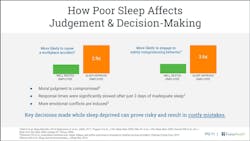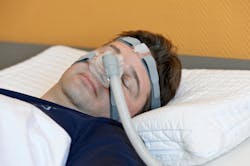Odd work hours or overnight shifts may be “the nature of the beast” for trucking, but the detrimental impact on driver health and performance is too profound to ignore, as a sleep expert and a fleet safety manager detailed in a recent FusionHealth webinar. The good news, corporate America is learning, is that a sleep management program can substantially improve employee wellbeing and effectiveness—and quickly.
FusionHealth co-founder and Chief Medical Officer Dr. Jeffrey Durmer opens his presentation by noting the high-profile catastrophes which share fatigue-related causes: the Chernobyl nuclear disaster, the Challenger explosion, and the Exxon Valdez oil spill.
More generally troubling, Americans increasingly suffer from “a culture of getting less sleep,” with research putting the level at 45% of the working population being sleep deprived on a daily basis. And while much of that population simply doesn’t get the sleep they need periodically, a substantial number of people have clinical sleep disorders, including 1 in 3 with insomnia, 1 in 4 with obstructive sleep apnea (OSA) and 1 in 10 with restless legs syndrome.
“Even 1 in 10 is a very large number when you look at your workforce,” Durmer says. “These are problems and disorders that are affecting people on a night-to-night basis and largely going undiagnosed and unaddressed by medical programs.”
In fact, OSA is undiagnosed in around 80% of the people who have it, he notes.
These problems—even after just one night of poor sleep—result in the loss of hormonal appetite regulation (causing weight gain) and toxic waste build-up in the brain, which can be dangerous over the long term. The toll rises to another level of severity for people with undiagnosed disorders, including cardiovascular disease, diabetes, and a much higher mortality risk.
“If we can get ahead of the sleep problem our country has, we may be able to get ahead of the accelerating chronic diseases and the costs associated with them,” Durmer notes.
As for the workplace, sleep deprivation results in a lack of focus, lost work time, more accidents and more errors. Durmer calculates that each sleep-deprived employee typically costs the company an average of eight days in lost productivity compared to well-rested employees.
Indeed, a sleep deprived employee is nearly three times more likely to cause an accident than a well-rested employee, and is 3.6 times more likely to engage in safety compromising behavior, according to researchers.
Specifically, the “executive functions”—processed in the brain’s frontal lobe—are impaired after several hours on task in people with sleep deprivation. Simply, “the A team” hands over control to less capable areas of the brain.
“This increases the mistakes and risks for an organization,” Durmer says. “When you have a sleep-deprived population, this is something that can drive up poor decision making, errors, and costs.”
And corporate American has taken notice. A McKinsey survey from earlier this year found that 70% of executives said sleep management should be taught in organizations, the same way time management and communication skills are taught now.
Durmer recommends a number of specific measures companies can take to help their employees. These include:
- Integrate population sleep health education as a business principle and create measures to improve the identification and assistance for employees facing these challenges.
- Assign workers to the shift hours that better align with their natural circadian rhythms.
- Discourage extended work hours and all-nighters by limiting access to work facilities and equipment when possible.
- Institute “blackout hours” for work by configuring corporate email servers to not update during certain off hour time periods.
Education, communication
Count Karla Staver, director of safety for Saia, as among those in corporate America who recognize the importance of a well-rested workforce—and who are doing something about it. The LTL carrier began looking into sleep management programs as a result of government regulators’ focus on fatigue, as well the impact on fleet safety and on the company’s aging driver population, she explains.
“The more we started to research, the more we found how sleep is interconnected to the safety record and accidents,” Staver says. “It’s apparent when drivers are falling asleep, but we were looking for an opportunity to find a root cause and to help them. Before, there was always the attitude that ‘that’s the nature of the beast,’ we have to move freight 24 hours. You encourage your drivers to come to work well rested, but what does ‘well rested’ mean to each driver. It’s very, very different and it’s very personal.”
She notes a summer uptick in accidents among Saia drivers who work the overnight shift, for example. The intuitive explanation is that kids are home from school, there are summer activities, and drivers are sacrificing sleep for time with their families.
“I think you do have to feel passionate about it, and make people understand,” she says. “You don’t know how bad you feel until you don’t feel it anymore.”
And Staver speaks from personal experience: In evaluating the FusionHealth program to understand the driver perspective, she went through the screening and discovered she suffered from OSA. Treatment paid off immediately, and—in addition to feeling better—she was taken off blood pressure medication after six months on a CPAP machine.
“That’s the problem with sleep disorders,” Durmer adds. “People have them for so many years and they live it with. They don’t understand it’s impacted their daytime until it’s removed. It’s like having weights on all day and then taking the weights off.”
To overcome employee concerns or reluctance, Staver emphasizes the importance of education and communication in implementing a sleep management program.
“There are so many benefits to their quality of life, their ability to contribute, so we as a company need to educate them on taking care of themselves and looking for the signals of sleep deprivation,” Staver says. “It is silent and it creeps up on you. Many people carry it as a badge of honor: ‘I only need five hours of sleep.’ But that’s what you think you need; you don’t realize what your body’s telling you.”
The complete presentation is available on line at FusionHealth.com.
About the Author
Kevin Jones 1
Editor
Kevin has served as editor-in-chief of Trailer/Body Builders magazine since 2017—just the third editor in the magazine’s 60 years. He is also editorial director for Endeavor Business Media’s Commercial Vehicle group, which includes FleetOwner, Bulk Transporter, Refrigerated Transporter, American Trucker, and Fleet Maintenance magazines and websites.


